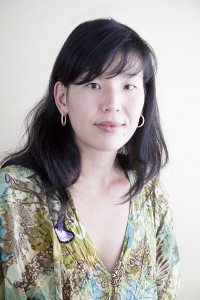Labor & Economy
Domestic Workers: Caring for the American Future

You can find us through Craigslist or fliers at the Laundromat. We live in your homes and prepare your meals. You leave beloved family members in our care. We come from around the globe, often leaving our children behind. But we’re invisible to most Americans. Who are we?
According to Ai-Jen Poo, Director of the National Domestic Workers Alliance, there are 100 million domestic workers in countries throughout the world. In the U.S. they’re key to America’s 21st century economy, caring for children, the elderly and the disabled while family members participate in the workforce. Domestic work is rapidly expanding, she explains, and doesn’t have to represent a road to permanent poverty for its mostly-female workforce.
With 44 local affiliated groups in 26 cities, the Alliance has sponsored legislation throughout the nation to adopt the Domestic Workers Bill of Rights, providing for paid leave, overtime pay and protections from harassment and discrimination for this overworked and underpaid group of women.

Ai-Jen Poo
These campaigns aren’t easy to win because domestic workers are isolated and largely invisible. By partnering with senior citizen and disability advocates in a coalition called Caring Across Generations, domestic workers can operate within the four arenas of power that Ai-Jen identifies as necessary for success: political power, the power of the personal story, disruptive power (over the status quo) and the power of consumers and the market.
But winning improved working conditions isn’t the whole story. Ai-Jen Poo is aiming at cultural change that would ultimately give domestic workers dignity and respect. She calls the effort “cultural acupuncture,” aimed at opening up space for empathy and compassion to flow within our society. She’d like our culture, in its heart and practices, to embrace aging, acknowledge caregiving as real work and view the multi-generational relationships that develop through caregiving as truly valuable.
“The 21st century way to create social change,” she explains, “is to determine where we can create win-win-win situations around our values. These values are simple: ensuring we can take care of ourselves, our families, our communities and future generations to come.”
And there’s one step more in the equation. If Ai-Jen Poo has her way, domestic workers, who have the most experience caring for the elderly and disabled, will be at the head of innovating new care procedures for the growing population of aging clients. That would truly give domestic workers the recognition and dignity they deserve.
(For more information about the National Domestic Workers Alliance, visit its website at https://www.domesticworkers.org/)

-

 Column - State of InequalityJanuary 22, 2026
Column - State of InequalityJanuary 22, 2026On Eve of Strike, Kaiser Nurses Sound Alarm on Patient Care
-

 Latest NewsJanuary 16, 2026
Latest NewsJanuary 16, 2026Homes That Survived the 2025 L.A. Fires Are Still Contaminated
-

 The SlickJanuary 20, 2026
The SlickJanuary 20, 2026The Rio Grande Was Once an Inviting River. It’s Now a Militarized Border.
-

 Latest NewsJanuary 21, 2026
Latest NewsJanuary 21, 2026Honduran Grandfather Who Died in ICE Custody Told Family He’d Felt Ill For Weeks
-

 The SlickJanuary 19, 2026
The SlickJanuary 19, 2026Seven Years on, New Mexico Still Hasn’t Codified Governor’s Climate Goals
-

 Latest NewsJanuary 22, 2026
Latest NewsJanuary 22, 2026‘A Fraudulent Scheme’: New Mexico Sues Texas Oil Companies for Walking Away From Their Leaking Wells
-

 The SlickJanuary 23, 2026
The SlickJanuary 23, 2026Yes, the Energy Transition Is Coming. But ‘Probably Not’ in Our Lifetime.
-

 The SlickJanuary 27, 2026
The SlickJanuary 27, 2026The One Big Beautiful Prediction: The Energy Transition Is Still Alive

